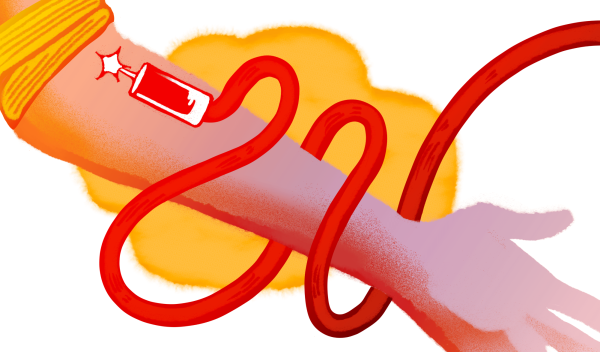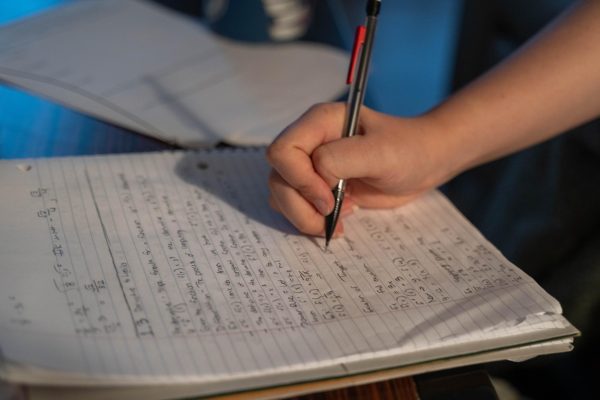World in Chaos: Persecuted Iranian singer unifies voices of Iranian people in fight for freedom
Professor Lily Ranjbar in her office in Merryfield Hall at Oregon State University on Feb. 21. She is from Isfahan, Iran and helps raise awareness of Iran’s current events for students and faculty.
Editor’s Note: This column does not represent the opinion of Beaver’s Digest. This column reflects the personal opinions of the writer.
“Woman. Life. Freedom.”
This was chanted by women and men, young and old, of all different ethnic and socioeconomic groups, marching down the streets in Iran, screaming from the top of their lungs. They were fed up and ready to fight, and the world was finally forced to hear them.
In the midst of the chaos and heartbreak, Iranian musical artist, Shervin Hajipour, was able to put into words the pain many were feeling. Hajipour wrote and performed the song “Baraye” and released it in a simple video on Instagram.
In the video, Hajipour can be seen alone in a room, singing into a microphone words that the Islamic Republic tried for years to erase. No recording studio, no backup singers or instruments, no producers present. Just Hajipour, his microphone, his stylish hair and a mountain of sadness. The song quickly started spreading all over social media, becoming a chant, a message, a goal, a thesis, murmured by Iranians all across the globe.
“It came from people’s hearts,” Lily Ranjbar, professor and director of online programs at College of Nuclear Science and Engineering at Oregon State University, said. “Every word of that song came from people’s hearts and things that they are fighting for and this is the beauty of the song.”
For Ranjbar, the song brought “joy, hope and sadness, at the same time.”
Since the vicious murder of 22-year-old Mahsa Amini by the hands of the Islamic Republic’s “morality police,” countless protests and demonstrations started not only in Iran but all over the world, and right here, in Corvallis, Ore on Oct. 17, 2022.
“That kind of hit hard,” Arman Askari, a computer science major who recently graduated from OSU, said about hearing the song for the first time. “My whole body started getting jitters and goosebumps. It was a type of feeling that I (had) never ever experienced before. It really hit you in the soul.”
In 1979, the Iranian people led a revolution (referred to as the Islamic Revolution) to overthrow the Pahlavi monarchy and become a democratic country with fair elections. The Islamic Republic founded by Ayatollah Khomeini, was elected in a national referendum later that year and the hope of secular democracy vanished. Now, nearly 40 years later, the Iranian people demand a true and secular democratic government without any religious influence, instead of a government that entraps, tortures and murders.
After Amini’s murder, Iranians all around the world were heartbroken and outraged. Protests and demonstrations were organized and Iranians living abroad were quick to express their support and solidarity with their brothers and sisters back home.
Ranjbar was among the professors at OSU that rushed to reach out to community members to spread awareness and express a supporting message to Iranian students impacted and overwhelmed with emotions.
“(Iranian students) woke up every morning and saw that people (were) killed, new names, new faces (of victims in Iran),” Ranjbar said. “We wanted at least some support from (student) advisors because they couldn’t do their work, they couldn’t study.”
Ranjbar spoke of the anxiety-inducing weeks following Amini and 16-year-old Nika Shakarami’s murder. Shakarami was murdered only weeks after Amini, her lifeless corpse was handed to her mother after the 16-year-old had been missing for days.
Askari also spoke about the disappointment he felt towards OSU’s lack of action.
“We were just kind of pissed at OSU, like, ‘Why are (you) not sending an email showing your support?’” Askari was among the students involved in organizing the protests on OSU campus.
Ranjbar, along with others at OSU, attempted to contact administrators to “at least send an email” that would bring awareness and acknowledge the pain many were feeling around campus. Ranjbar knew all too well that students and staff alike “were struggling to do their work because those days were so emotional for them.”
On top of the thousands of arrests and deaths, internet shutdowns and blockage crafted by the Islamic Republic prevented international students from contacting their loved ones in Iran.
The song “Baraye” is, in a way, a compilation of everything Iranians are fighting for. For the ban on dancing or music, for bigotry, for endless nights of crying and for the lack of freedom to be who you truly are; these are only a few of the many wounds that Iranians are desperate to remedy, and all are beautifully crafted into a song by Hajipour in the form of a list.
“Even though the list is not complete, there are so many reasons that people want to fight this religious government,” added Ranjbar. “Iranian people are fighting with evil.”
Shortly after the release of the song, Hajipour was arrested by the Islamic Republic security forces and the video of “Baraye” mysteriously disappeared from his Instagram page. Hajipour was later released on bail but his social media is allegedly not run by himself.
On Feb. 5, Hajipour’s song won “Best Song for Social Change” at the 2023 Grammy Awards, in a new awards category presented by the First Lady Jill Biden.
“It felt like a recognition or acknowledgment that we kind of got from (the Grammy’s),” Askari said. “We have (gotten) noticed. On a very big stage.”
After Biden announced (and mispronounced) Hajipour as the winner, perhaps many were wondering who would walk up to the stage to receive the award. Evidently, no one did. Later that night, Iranians shared the video of Hajipour’s reaction to winning the Grammy from miles away and, once again, we all cried alongside him.
“I was thinking about Shervin (Hajipour) and all the brave Iranian people who are fighting,” Ranjbar said.
Hajipour’s song undoubtedly became the anthem for the revolution. What was inspired from a few tweets became the embodiment of all the suffering Iranians went through by the hands of the Islamic Republic for four long decades.
When asked what part of the song stood out to him the most, Askari said “I guess the one that I always remember is (for dancing in the streets, for the fear of kissing),” Askari said of what stood out most to him about the song. “It’s such a (normal thing) that you can easily do here that you can not do in Iran.”
Intimacy or any display of that nature is banned by security forces such as the morality police who killed Amini and tortured many more.
“This is a revolution,” Ranjbar said. “We don’t call this a protest anymore.”
Ranjbar emphasized the severity of the situation in Iran. Despite excessive concern and anxiety, there is also a great deal of hope among Iranians that one day we will see a free Iran.
“It will happen. It may take some time but it will happen,” Askari said.
“Baraye” by Shervin Hajipour
For dancing in the streets
For the fear when kissing
For my sister, your sister, our sisters
For changing the rotten brains
For the shame of inability to provide, for being penniless
For yearning of just a normal life
For the dumpster diving boy and his dreams
For this planned economy
For this polluted air
For Valiasr street and its tired dying trees
For Piruz and his possible extinction
For the massacre of the innocent dogs
For these never ending tears
For the dream of a moment that will never happen again
For the smiling faces
For the students, for future
For this heaven being forced on you
For the imprisoned intellectual elite
For the discriminated Afghan children
For each and every one of all of these “for”s
For all these empty propaganda chants
For the houses in rubble, collapsing like a house of cards
For the feel of peace
For the sun after long nights
For all the pills for nerves and insomnia
For men, homeland and prosperity
For the girls wishing they were boys
For women, life, freedom
For freedom
For freedom
For freedom
* Translation from here.








Nazanin • Mar 9, 2023 at 1:31 am
Great read